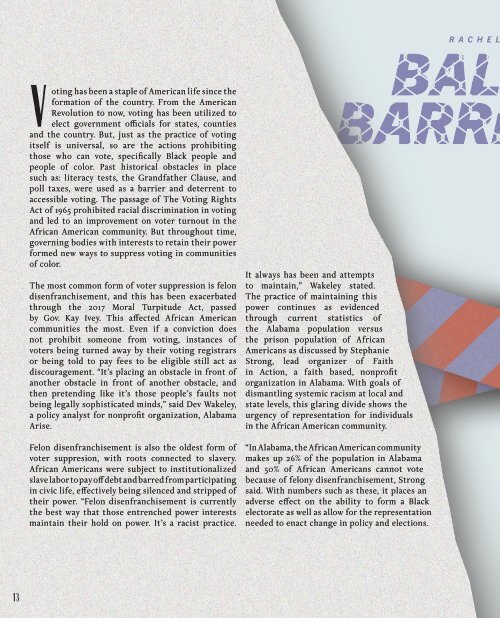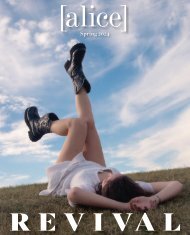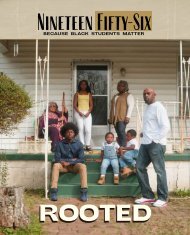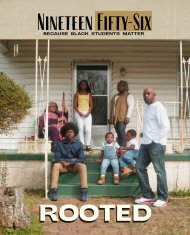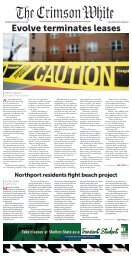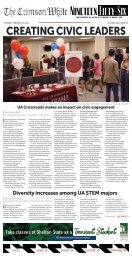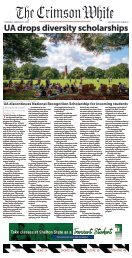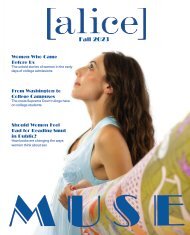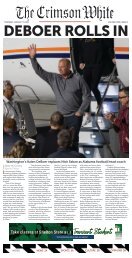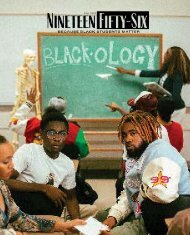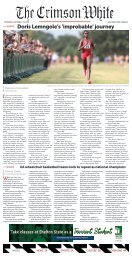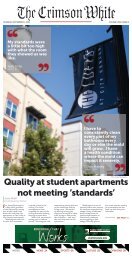Nineteen Fifty-Six Vol. 1 No. 1 Inspiring Firsts
This is the very first issue of Nineteen Fifty-Six magazine. The theme, Inspiring Firsts, can be seen throughout the magazine as we showcased Black students at the University whose firsts paved the way for future Black students.
This is the very first issue of Nineteen Fifty-Six magazine. The theme, Inspiring Firsts, can be seen throughout the magazine as we showcased Black students at the University whose firsts paved the way for future Black students.
Create successful ePaper yourself
Turn your PDF publications into a flip-book with our unique Google optimized e-Paper software.
R A C H E L<br />
V<br />
oting has been a staple of American life since the<br />
formation of the country. From the American<br />
Revolution to now, voting has been utilized to<br />
elect government officials for states, counties<br />
and the country. But, just as the practice of voting<br />
itself is universal, so are the actions prohibiting<br />
those who can vote, specifically Black people and<br />
people of color. Past historical obstacles in place<br />
such as: literacy tests, the Grandfather Clause, and<br />
poll taxes, were used as a barrier and deterrent to<br />
accessible voting. The passage of The Voting Rights<br />
Act of 1965 prohibited racial discrimination in voting<br />
and led to an improvement on voter turnout in the<br />
African American community. But throughout time,<br />
governing bodies with interests to retain their power<br />
formed new ways to suppress voting in communities<br />
of color.<br />
The most common form of voter suppression is felon<br />
disenfranchisement, and this has been exacerbated<br />
through the 2017 Moral Turpitude Act, passed<br />
by Gov. Kay Ivey. This affected African American<br />
communities the most. Even if a conviction does<br />
not prohibit someone from voting, instances of<br />
voters being turned away by their voting registrars<br />
or being told to pay fees to be eligible still act as<br />
discouragement. “It’s placing an obstacle in front of<br />
another obstacle in front of another obstacle, and<br />
then pretending like it’s those people’s faults not<br />
being legally sophisticated minds,” said Dev Wakeley,<br />
a policy analyst for nonprofit organization, Alabama<br />
Arise.<br />
Felon disenfranchisement is also the oldest form of<br />
voter suppresion, with roots connected to slavery.<br />
African Americans were subject to institutionalized<br />
slave labor to pay off debt and barred from participating<br />
in civic life, effectively being silenced and stripped of<br />
their power. “Felon disenfranchisement is currently<br />
the best way that those entrenched power interests<br />
maintain their hold on power. It’s a racist practice.<br />
It always has been and attempts<br />
to maintain,” Wakeley stated.<br />
The practice of maintaining this<br />
power continues as evidenced<br />
through current statistics of<br />
the Alabama population versus<br />
the prison population of African<br />
Americans as discussed by Stephanie<br />
Strong, lead organizer of Faith<br />
in Action, a faith based, nonprofit<br />
organization in Alabama. With goals of<br />
dismantling systemic racism at local and<br />
state levels, this glaring divide shows the<br />
urgency of representation for individuals<br />
in the African American community.<br />
“In Alabama, the African American community<br />
makes up 26% of the population in Alabama<br />
and 50% of African Americans cannot vote<br />
because of felony disenfranchisement, Strong<br />
said. With numbers such as these, it places an<br />
adverse effect on the ability to form a Black<br />
electorate as well as allow for the representation<br />
needed to enact change in policy and elections.<br />
13


